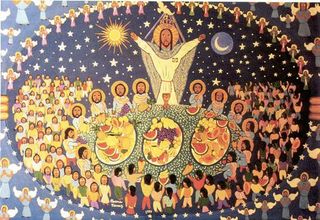In this week’s readings, there are some strange juxtapositions. In the first reading, those who cry out for God to intervene on behalf of justice are told to… wait. And in the Gospel, the servants who are eager to come to the feast are told to… wait.
Who likes to wait? Indeed, one of the characteristics of our age is less and less time spent in the position traditionally understood as “waiting.” Once, if you were meeting a friend, you waited when they were late. Now they will text you with a new ETA. Once, you stood on a corner and hoped a bus would come, peering off into the distance. Now I look on my busETA app and it tells me exactly where the bus is. It’s true that we still find ourselves waiting, but really, with certain knowledge of when “fulfillment” is going to happen, we are no longer “waiting” in the former sense. We no longer have to have faith. In a sense, we can see the future.
The fulfillment of God’s promise, we can see, is not like that. There’s no app for it, no way to arrange it. And importantly, there’s no way to bring the promises to fulfillment more quickly on our own. Such rashness is in fact a sign of the world’s injustice and impatience.
The substitute for rashness, however, is not simply a stoical resignation, a do-nothing attitude, a sense that “that’s just the way it is.” Instead, the readings indicate that this is exactly what “faith” is supposed to mean. It is not simply belief in static truths, but more importantly, belief in God’s dynamic action. It is faith in this beautiful promise from Habakkuk in the first reading:
For the vision still has its time,
presses on to fulfillment, and will not disappoint;
if it delays, wait for it,
it will surely come, it will not be late.
It is also why Jesus remarks strikingly that faith “the size of a mustard seed” will be enough to uproot trees (or, as in another Gospel) move mountains. What this means is that “faith” names the belief that God is truly acting, God is truly bringing about the Kingdom. If we believe this, we will be happy to confess that “we are unprofitable servants” who have only done what we were commanded to do. What could be better than to do what is necessary to serve the One who will bring about the feast, the banquet, the celebration, the justice and mercy that we all long for?
The readings do not present faith as the opposite of activity per se. They present faith as the opposite of rash, impetuous, presumptuous activity, activity that presumes a god-like knowledge and control. We see destruction, ruin, and violence all around us. We know “strife” and (certainly!) “clamorous discord.” Instead of adding to the violence and discord by our own rash responses, let us first and foremost “increase our faith,” so that we recognize that God’s vision “still has its time” and “will not disappoint.”
Readings: Hab 1:2-3;2:2-4; Ps 95; 2 Tm 1:6-8,13-14; Lk 17:5-10





